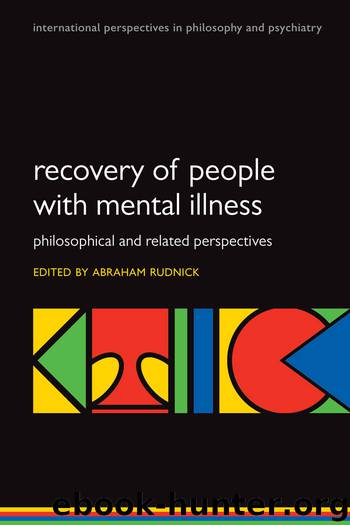Recovery of People with Mental Illness : Philosophical and Related Perspectives by Rudnick Abraham

Author:Rudnick, Abraham
Language: eng
Format: epub
Tags: Philosophical and Related Perspectives
Publisher: Oxford University Press
Published: 2012-11-17T16:00:00+00:00
Conclusion
Generative models, as a group, tend to organize psychic difference and psychic suffering around the metaphorical frame of sensitivity. As we saw in our discussion of creative/expressive models, sensitivity can be considered a good thing. This is in contrast to common clinical approaches that help people to reduce their sensitivities by means of medication or various psychotherapeutic interventions. When we move to generative models, we turn the kaleidoscope and sensitivity becomes a state to appreciate, and an advantage rather than a disadvantage. The sensitive artist is nearly always a good thing. Similarly, from a spiritual perspective, we admire a spiritual person’s sensitive yearning for higher levels of consciousness and mystical experience. Equally, from a political perspective, we want revolutionaries like Mahatma Ghandi and Martin Luther King to be sensitive to political oppression. We do not want them to dampen their sensitivity or put their insights in a quiet room. As Sasha DuBrul, Ashley Jacks McNamara, and the Icarus Project have shown, creative, spiritual, and political sensitiveness can all be crucial catalysts that help to transform not only people, but also cultures and subcultures. All of these sensitivities allow people to access generative and invaluable realms of being that many “normal” people can never reach.
Taking these generative models seriously, we can join them with the more commonly understood clinical models. The goal is not to find the only true model, but to respect the multiplicity of models. By staying open to clinical and generative models we create a wealth of metaphorical possibilities for narrating the story of psychic difference. The recovery process uses various models of psychic difference to help people to build narrative identities that put their psychic life in context. These narrative identities have a plot structure that helps people to make sense of the past and the present, and that provides direction for their future. Narrative theory shows how the options for creating these identities are infinite, but this need not make the possibilities overwhelming. The narrative identities that people create usually involve a hybrid combination of models suited to the particulars of their experiences, their individual preferences, and their real-life possibilities. However, at the same time it is no simple matter to develop these identities. They require patience, imaginative creativity, and a willingness to experiment with different options.
Empathic recovery allies can be invaluable in the process of recovery. Helpful recovery allies have a deep understanding of narrative tools and narrative possibilities, whether they have studied narrative theory or not. Studying narrative theory adds to the work by helping to articulate the process and providing a conceptual foundation and scaffold for the transformative journeys involved. Narrative theory empowers consumers and recovery allies to recognize that there are many ways to tell the story of psychic life. This empowerment is especially important in cultural settings where there is tremendous hype and pressure to reduce the meaning of psychic difference to singular and often pathological models. The hype does not make pathological models bad. Pathological models have their place, but they should not be idealized, any more than generative models should be idealized.
Download
This site does not store any files on its server. We only index and link to content provided by other sites. Please contact the content providers to delete copyright contents if any and email us, we'll remove relevant links or contents immediately.
Periodization Training for Sports by Tudor Bompa(8254)
Why We Sleep: Unlocking the Power of Sleep and Dreams by Matthew Walker(6706)
Paper Towns by Green John(5179)
The Immortal Life of Henrietta Lacks by Rebecca Skloot(4579)
The Sports Rules Book by Human Kinetics(4379)
Dynamic Alignment Through Imagery by Eric Franklin(4208)
ACSM's Complete Guide to Fitness & Health by ACSM(4057)
Kaplan MCAT Organic Chemistry Review: Created for MCAT 2015 (Kaplan Test Prep) by Kaplan(4008)
Introduction to Kinesiology by Shirl J. Hoffman(3766)
Livewired by David Eagleman(3765)
The Death of the Heart by Elizabeth Bowen(3610)
The River of Consciousness by Oliver Sacks(3599)
Alchemy and Alchemists by C. J. S. Thompson(3516)
Bad Pharma by Ben Goldacre(3422)
Descartes' Error by Antonio Damasio(3271)
The Emperor of All Maladies: A Biography of Cancer by Siddhartha Mukherjee(3155)
The Gene: An Intimate History by Siddhartha Mukherjee(3094)
The Fate of Rome: Climate, Disease, and the End of an Empire (The Princeton History of the Ancient World) by Kyle Harper(3055)
Kaplan MCAT Behavioral Sciences Review: Created for MCAT 2015 (Kaplan Test Prep) by Kaplan(2984)
